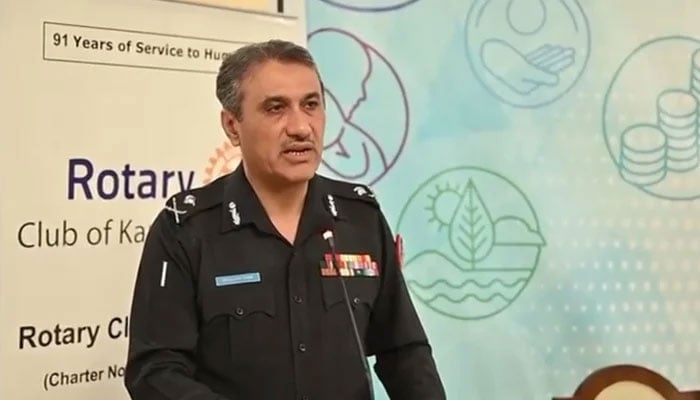IGP told to address increasing FIRs against innocent citizens
The Sindh High Court (SHC) on Tuesday directed the provincial police chief to take immediate steps to address the proliferation of motivated FIRs tainted with malice against innocent individuals, ensuring that genuine FIRs against actual offenders are not hindered.
The direction came in a matter pertaining to the registration of FIRs by lawyers against their clients as well as police officials at different police stations of Karachi. The court had directed the IG to submit a complete report about the FIRs lodged by advocates against their clients and third persons this year and their disposal, including the details. The legal AIGP submitted a report on FIRs lodged by advocates from January 1 to October 31.
An SHC division bench comprising Justice Salahuddin Panhwar and Justice Adnanul Karim Memon said advocates have lodged 609 FIRs: 14 against their own clients, 14 against police officials and an overwhelming 581 against third parties in the entire province over the past 10 months.
The court said that in a majority of instances, police reports have been filed under A and C class categories, while investigations in others FIRs remained pending. The bench said that such an extensive volume of FIRs raises significant concerns, especially given that even members of the legal profession are among the complainants, citing threats of dire consequences, incidents of theft, and cheque dishonour as grounds for the FIRs’ registration.
The court said that a substantial portion of these FIRs involves allegations under sections 506-B and 489-F of the Pakistan Penal Code, adding that this substantial influx of FIRs suggests a troubling scenario, indicating either a failure of the state to safeguard the legal community or a potential misuse of their professional privileges by these individuals.
The bench directed the police to take immediate steps to address the proliferation of motivated FIRs tainted with malice against innocent individuals, ensuring that genuine FIRs against actual offenders are not hindered.
The court said that failure to do so might result in a situation where it is too late to rectify the injustices, leading to irreparable harm and a complete breakdown of the rule of law. The bench said the court is cognisant of the fact that the present matter bears significant implications for the legal profession, particularly concerning the regulation of professional conduct and ethics, which fall within the domain of the bar council.
The court also referred the matter to the executive committee of the Sindh Bar Council, with directives to scrutinise the ethical dimensions outlined in the code of conduct, specifically regarding the registration of FIRs by advocates against their own clients under various sections of law.
The bench asked the committee to investigate any misuse of professional privileges by lawyers throughout the province, with particular attention to occurrences in Karachi, to uphold the dignity and integrity of the legal fraternity.
The court said if the committee identifies any instances of malicious or unwarranted FIRs filed against innocent individuals, it may initiate appropriate disciplinary actions through the relevant disciplinary committee.
The bench said that this measure aims to safeguard the ethical standards, and prevent any conduct that can undermine the honour of the legal profession. The court directed the police chief to ensure that law and order is maintained, guaranteeing equal treatment to all citizens regardless of profession, caste, creed or community.
The bench also directed the IG to ensure that police officers uphold the decorum of the police force while providing safety and security to all citizens within their respective jurisdictions, including the courts.
-
 'Elderly' Nanny Arrested By ICE Outside Employer's Home, Freed After Judge's Order
'Elderly' Nanny Arrested By ICE Outside Employer's Home, Freed After Judge's Order -
 Keke Palmer On Managing Growing Career With 2-year-old Son: 'It's A Lot'
Keke Palmer On Managing Growing Career With 2-year-old Son: 'It's A Lot' -
 Key Details From Germany's Multimillion-euro Heist Revealed
Key Details From Germany's Multimillion-euro Heist Revealed -
 David E. Kelley Breaks Vow To Cast Wife Michelle Pfeiffer In 'Margo's Got Money Troubles'
David E. Kelley Breaks Vow To Cast Wife Michelle Pfeiffer In 'Margo's Got Money Troubles' -
 AI-powered Police Robots To Fight Crime By 2028: Report
AI-powered Police Robots To Fight Crime By 2028: Report -
 Everything We Know About Jessie J's Breast Cancer Journey
Everything We Know About Jessie J's Breast Cancer Journey -
 Winter Olympics 2026: What To Watch In Men’s Hockey Today
Winter Olympics 2026: What To Watch In Men’s Hockey Today -
 Winnie Harlow Breaks Vitiligo Stereotypes: 'I'm Not A Sufferer'
Winnie Harlow Breaks Vitiligo Stereotypes: 'I'm Not A Sufferer' -
 Apple Martin Opens Up About Getting 'crazy' Lip Filler
Apple Martin Opens Up About Getting 'crazy' Lip Filler -
 Why Did OpenAI Remove One Crucial Word From Its Mission Statement?
Why Did OpenAI Remove One Crucial Word From Its Mission Statement? -
 Prince William Warned His Future Reign Will Be Affected By Andrew Scandal
Prince William Warned His Future Reign Will Be Affected By Andrew Scandal -
 Amy Madigan Reflects On Husband Ed Harris' Support After Oscar Nomination
Amy Madigan Reflects On Husband Ed Harris' Support After Oscar Nomination -
 Is Studying Medicine Useless? Elon Musk’s Claim That AI Will Outperform Surgeons Sparks Debate
Is Studying Medicine Useless? Elon Musk’s Claim That AI Will Outperform Surgeons Sparks Debate -
 Margot Robbie Gushes Over 'Wuthering Heights' Director: 'I'd Follow Her Anywhere'
Margot Robbie Gushes Over 'Wuthering Heights' Director: 'I'd Follow Her Anywhere' -
 'The Muppet Show' Star Miss Piggy Gives Fans THIS Advice
'The Muppet Show' Star Miss Piggy Gives Fans THIS Advice -
 Sarah Ferguson Concerned For Princess Eugenie, Beatrice Amid Epstein Scandal
Sarah Ferguson Concerned For Princess Eugenie, Beatrice Amid Epstein Scandal




